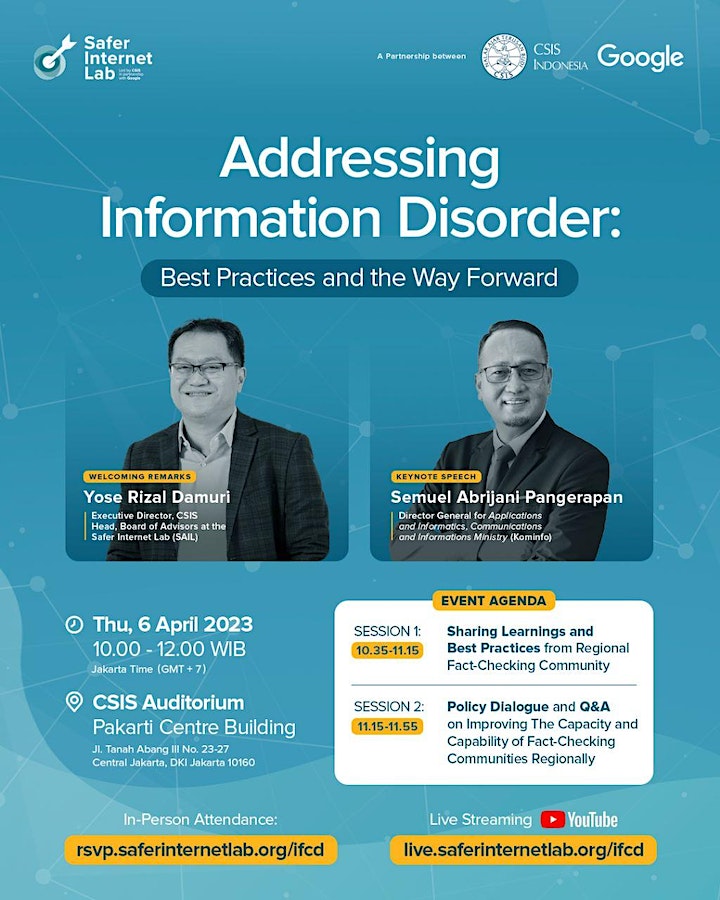Addressing Information Disorder: Best Practices and the Way Forward
Background
While misinformation and disinformation remains a key concern, stakeholders and grassroots communities across the Asia-Pacific region are increasingly coming together to counter these trends.
On the occasion of International Fact-Checking Day, the new Safer Internet Lab is gathering its first collaborative exchange between experts and practitioners to share lessons from experiences based on best practices of current initiatives and the way forward for policymakers:
Current Industry Best Practices
- Industry Innovations and Policies: Highlight industry best practices in product policies that help counter malicious actors and innovations to verify information from credible sources.
- Building Fact-checking Communities: Fact-checking initiatives have flourished in several countries in the region, bringing together journalists and academics alongside online platforms and grassroots actors to make a positive impact in local communities. These initiatives are among the most robust fact-checking networks in the world. This will be a collaborative exchange between experts and practitioners to share lessons from experiences in places such as Indonesia and Taiwan and at the ASEAN level about how to set up efficient fact-checking and networks, how to link various stakeholder groups together, and what are some of the more effective activities that fact-checking communities can put in place to counter misinformation and empower Internet users.
- Empowering citizens to tackle Misinfo: Digital literacy education programs to create awareness and equip users to verify sources, fact-check information, and even report when they identify Misinfo.
Future Recommendations
- Provide policymakers with recommendations on the way forward in building fact-checking community.
This discussion is intended to
- Highlight that Misinfo is an evolving issue and should be a joint effort from all different entities (Government, Journalists, Tech Platforms, Users) and needs to be a continued collaboration.
- Inform the creation or expansion of fact-checking efforts in other parts of the Asia-Pacific region and the exchanges of the G7 Misinformation Forum to be held in Japan on 26 April 2023.
This would be a discussion to share experiences, learnings, and emerging successes in tackling Misinfo, this includes the different initiatives from product policies, citizen education and setting up and operating fact-checking communities and capabilities in the Asia-Pacific region. Key participants includes:
- Indonesia’s fact-check communities to explain how their network was established and what ‘tips’ they may give to other countries in the region on how to successfully set up a fact checking centre in their country – Cekfakta’s playbook
- Regional Fact-Check Centers from Indonesia, Taiwan, Japan, and the Philippines (in confirmation) on the advantages of a public private partnership bringing together online platforms, tech experts, journalists, academics and wider civil society, to make serious progress on fact checking as a key tool in the fight against disinformation.
- The Centre for Strategic and International Studies (CSIS), a policy-oriented think tank focusing on Indonesia and Southeast Asia and SAIL’s lead organisation that has conducted research on online hate speech and G20 digital skills
- Google to be present as a technology platform to highlight the policies in place to protect users from harm, the innovations to fight the ever evolving issue of misinfo to surface information from authorized sources and fight the bad actors and our efforts in the news ecosystem to tackle misinfo (such as fact checking community)
Policy Dialogue
- Discuss how information disorder continues to evolve.
- Share best practices in addressing mis/disinformation and setting up fact-check centres.
- Illustrated the importance of collaboration between industry experts, tech platforms, and the Government to play a role in the fight against misinformation continually.
Part 1: Fact Check Communities
- How is the role of the fact-checking community evolving in the fight against misinformation: What are some more effective activities that fact-checking communities can put in place to counter misinformation and empower Internet users?
- What were the steps undertaken to set up fact-checking communities (such as how to link various stakeholder groups together and sustain impact)?
- What are the challenges faced by fact-check communities, and how to overcome them?
Part 2: Policy Discussion
- What is the role of tech platforms in fighting misinformation? How is the role evolving in addressing misinformation, especially regarding fact-checking?
- What are the kinds of platforms’ innovations and policies that are useful in safeguarding and protecting users from the harm of misinformation?
- In addressing information disorder through fact-checking, how can policymakers support and facilitate collaborations among key stakeholders? This can be local and even regional.
- What are the ways that we can do to drive more awareness of the importance of fact-checking to citizens?
Key Takeaways from the dialogue
- We want policymakers to recognize the depth of the current initiatives from fact-checking communities and tech platforms that have been successful in helping to tackle misinformation.
- We would also want to provide guidance on what are the critical components that policymakers need to pay attention to and what steps they could take in the short and long term.
Download Event Repot:

